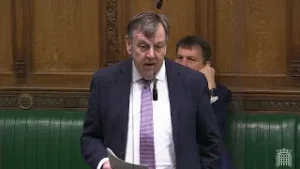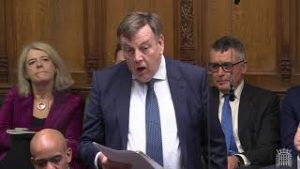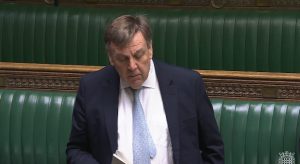John Healey The Secretary of State for Defence
Today, HMS Prince of Wales set sail from Portsmouth. I trust that the whole House will join me in wishing the entire carrier strike group a safe and successful global deployment. [Hon. Members: “Hear, hear.”]
Mr Speaker, I wish to make a statement on the ongoing war in Ukraine. Today, Parliament returns from our Easter break, and during the past two weeks Putin’s illegal invasion of Ukraine has continued, with drone strikes, missile attacks and fierce fighting on the frontline. On Palm Sunday, men, women and children in Sumy on their way to church were hit by Putin’s deadliest attack on Ukrainian civilians so far this year, killing 35 people, including young children, and injuring over 100 more. We are united in condemnation of this brutal attack and of Putin’s illegal actions.
At this critical moment for Ukraine and for European security, we have stepped up the Government’s efforts in support of Ukraine, and we will step up further to increase military support for the fight today and to secure peace for tomorrow. We cannot jeopardise the peace by forgetting about the war, so 10 days ago in Brussels, the UK convened and I co-chaired the 27th meeting of the Ukraine defence contact group, alongside my good friend the German Defence Minister Boris Pistorius. Some 51 nations and partners from Europe, the Indo-Pacific and South America came together at NATO headquarters with Ukrainian President Zelensky, US Defence Secretary Hegseth and NATO Secretary-General Mark Rutte. We came together to step up support for Ukraine in the fight. Together we pledged a record €21 billion of military support to put Ukraine in the strongest possible position and to increase pressure on Putin to negotiate.
This year, the UK is providing £4.5 billion in military support to Ukraine—more than ever before. In Brussels, I announced that £200 million of that support will be surged to the frontline, with supplies starting to reach Ukraine’s fighters within this month, including radar systems, anti-tank mines and hundreds of thousands of drones. I also announced £160 million to help repair and maintain essential battlefield vehicles and equipment. This support will strengthen Ukrainian troops in the close fight, and it will also strengthen our industrial links with Ukraine and boost UK businesses.
President Trump talks about peace through strength, and it is the commitments made through the Ukraine defence contact group that provide the strength to secure that peace. Despite President Putin’s promise of a 30-hour pause in fighting, I can confirm that Defence Intelligence has found
“no indication that a ceasefire on the frontline was observed over the Easter period”.
Some 10,000 missiles and drones have been fired into Ukraine this year alone, including from the Black sea. While Putin has said he declared an Easter truce, he broke it. While Putin says he wants peace, he has rejected a full ceasefire. While Putin says he wants to put an end to the fighting, he continues to play for time in the negotiations.
The Russian military continues to pressure Ukraine on a number of fronts. I can confirm that Russian military progress is slowing. Putin gained less territory in March than he did in February, and less territory in February than he did in January. Ukrainian towns that Russia has been targeting since before Christmas have still not been captured. Ukrainian troops have still not been ejected from Russian territory in Kursk.
Whatever ground Putin is taking comes at a huge human cost. More than 940,000 Russians are likely to have been killed or injured in the war so far, including 150,000 killed or injured this year alone. Last month the average daily casualty rate on the Russian side was 1,300, almost double the rate this time last year. At home, Putin faces crippling interest rates of 21%, while inflation is running at over 10% and the Russian Government are spending nearly 40% of their entire budget on his military campaign. It is, however, likely that in the days ahead Russia will keep up attacks on the Sumy oblast to help it to reclaim nearby contested areas of Kursk.
In the central Donetsk oblast, Russia is targeting urban strongholds such as Toretsk, Povrosk and Chasiv Yar, and in Kharkiv, Russia continues to make assaults towards the rail and logistics hub of Kupiansk. We expect more ground to be taken and more Russian missiles to be fired into Ukraine, which is why we must remain united for Ukraine—across the House, across the country, and across those nations standing alongside Ukraine. We must step up support for Ukraine and pressure on Putin, to force him to recognise that now is the time for peace and that continuing the war will prove to be much worse for Russia in the long run.
We believe that peace is possible, and we must be ready for when that peace comes, so as well as providing vital military aid, the UK Government continue the push for peace. The Foreign Secretary joined ceasefire discussions with the United States, France, Germany and Ukraine in Paris last week, and in Brussels 10 days ago, along with my good friend the French Defence Minister, Sébastien Lecornu, I convened and co-chaired the first Defence Ministers’ meeting of the coalition of the willing, with 30 countries coming together to build on the hard work of more than 200 military planners from Europe and beyond.
That operational planning must remain classified, but I can assure the House that the plans are real, substantial and well developed. Our reassurance force will have clear objectives for Ukraine: first, to secure safe skies; secondly, to secure safe seas; thirdly, to support peace on the land; and fourthly, to help the Ukrainian armed forces become their own strongest possible deterrent against future Russian attacks. In the days ahead this detailed planning will continue, domain by domain, and nations will continue to provide firm commitments for the coalition. Tomorrow I will meet Ukrainian Defence Minister Umerov and other allies as the Government bring together the United States, the United Kingdom, and European Ministers and national defence security advisers to discuss the next steps. That will include discussing what a ceasefire might look like, and how to secure peace in the long term.
This war was never just about the fate of one nation. It is about not allowing national borders to be redrawn by force, and about preventing aggressors across the world from being emboldened to threaten the security of all nations. That is why the defence of the UK starts in Ukraine. It is why UK leadership is playing a unique role, to put Ukraine in the strongest position on the battlefield and in negotiations, and to prepare the building blocks for a lasting peace that will safeguard Ukraine’s sovereignty and deter Putin from future aggression. I hope that the House will join me in sending a signal to President Putin, and in saying to Ukraine, “We will stand with you in the fight and we will stand with you in the peace, whenever that may come.”
John Whittingdale Conservative, Maldon
The Secretary of State rightly began his statement by condemning the Russian missile attack on Sumy on Palm Sunday, which killed civilians and children. However, he will be aware of Russian claims that this was a military target and that 60 Ukrainian military commanders were killed, as were NATO servicemen who were “in charge”. Can he confirm that we will not only provide increased military support to Ukraine, but step up efforts against Russian lies in the information war?
John Healey The Secretary of State for Defence
I can indeed. These were men, women and children on their way to church; children were killed and severely injured in the attack. Madam Deputy Speaker, I know you want short questions and short answers at this stage.


